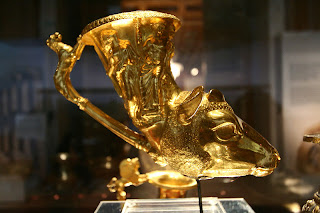The public comment period has begun regarding the Bulgarian government’s request for cultural property protections by the United States. The Cultural Property Advisory Committee (CPAC) meets on November 16, 2011 to consider the matter—as well as a similar request by the government of Belize—for import protections pursuant to the Cultural Property Implementation Act (CPIA).
Ancient coin collectors this week actively have been submitting comments to CPAC, appearing to have responded to listserv calls to contact the committee in opposition to the Bulgarian request. Few electronic comments in support have been filed. Most comments thus far are from individuals as opposed to institutions.
As of this writing, 44 total public submissions have been made (UPDATE: 216 submissions as of October 26, 2011; 421 submissions as of midday November 2, 2011; 504 as of November 3, 2011 after the November 2 deadline), largely voicing opposition to protections covering ancient coins. Three sample comments in opposition and one sample comment in support appear below:
“Although assistance should be given to Bulgaria to restrict the import of specific types of antiquities that can only have originated in that country, coins should not be included. . . . There is no way to tell if a coin was found in Bulgaria or some other Mediterranean country, and the claim that all such coins are property of Bulgaria is not supported by law or common sense. . . . Yours sincerely, Jeffrey Spier Fellow, American Numismatic Society.”
“I am very passionate about: collecting Roman Imperial and Greek coins. I am very troubled by restrictions on collecting that would kill my hobby. This is much more than a hobby. Yes I collect coins. I am also preserving history and sharing it with school children during classmate presentations. There are billions of pre – 1600 coins. These are not rare pieces. They are found in lots of 1000 . . . .”-David Hunt
“Bulgaria wants to restrict exporting antiquities (such as the coins?) that are already spread around the world and are not very valuable to begin with? Really?! Come on; don’t go there! It’s just silly…” –Col Dupont, C L Dupont Ancient Coin Jewelry
“I write in full support of Bulgaria’s recent request that the US accepts the petition, to help the country protecting its great heritage. It is a mystery to me how one should officially legitimate cases like the one very recent, were (sic) 21,000 objects have left Bulgaria illegally, were shipped half across the world to end up in North America. Thousands of objects would have ended up on the market, sold by those who make private profit with the heritage of another country while not respecting Bulgarian laws as well as not respecting American laws relating to stolen property. In 1992, some 5,000 icons were disappearing in one single year from Bulgaria. Bulgaria’s request should get full support. . . .” –Nagel Alexander, Smithsonian Institution
Mr. Alexander’s comment appears to reference the June 2011 return by Canada of 21,000 illegally imported ancient coins, jewelry, and cultural artifacts and seized by the Royal Canadian Mounted Police in November 2008. The Canadian government observed in a June 10, 2011 press release marking the repatriation of the cultural objects: “These objects, many of which were illegally excavated, cover more than 2600 years of the history of Bulgaria. This collection includes more than 18,000 coins, as well as a number of artifacts including bronze eagles, rings, pendants, belt buckles, arrows and spearheads, and bone sewing needles. They represent a mix of Hellenistic, Roman, Macedonian, Byzantine, Bulgarian, and Ottoman cultural heritage.” Access the full press release at http://www.pch.gc.ca/pc-ch/infoCntr/cdm-mc/index-eng.cfm?action=doc&DocIDCd=CR110217.
Recently, the Archaeological Institute of America issued a call to action on its web site, posting “Support the preservation of Belizean and Bulgarian archaeological heritage by writing a letter to the Cultural Property Advisory Committee urging them to create bilateral agreements with Belize and Bulgaria!” http://archaeological.org/CPAC
Those wishing to submit public comment can go to http://www.regulations.gov/#!submitComment;D=DOS-2011-0115-0001. Comments should address the so-called “four determinations” under the CPIA. Quoting the statute, the four determinations are:
(A) [whether] the cultural patrimony of the State Party is in jeopardy from the pillage of archaeological or ethnological materials of the State Party;
(B) [whether] the State Party has taken measures consistent with the Convention to protect its cultural patrimony;
(C) [whether] —
(i) the application of the import restrictions . . . with respect to archaeological or ethnological material of the State Party, if applied in concert with similar restrictions implemented, or to be implemented within a reasonable period of time, by those nations (whether or not State Parties [to the 1970 UNESCO Convention]) individually having a significant import trade in such material, would be of substantial benefit in deterring a serious situation of pillage, and
(ii) remedies less drastic than the application of the restrictions set forth in such section are not available; and
(D) [whether] the application of the import restrictions . . . in the particular circumstances is consistent with the general interest of the international community in the interchange of cultural property among nations for scientific, cultural, and educational purposes.
_____________
Photo of Thracian rhtyon used pursuant to Creative Commons permission: The Panagyurishte Treasure, October 2009, author http://www.flickr.com/photos/sitomon/.
CONTACT INFORMATION: www.culturalheritagelawyer.com. DISCLAIMER: The information provided on this web site/email/blog/feed is general information only, not legal advice, and not guaranteed to be current, correct, or complete. No attorney-client relationship is formed, and no express or implied warranty is given. Links or references to outside sources are not endorsements. This site may be considered attorney advertising by some jurisdictions. The attorney is licensed in NH. The attorney is not certified by the TX Board of Legal Specialization, nor certified by NY regulators as a so-called “specialist” or “expert.” Do not send confidential communications through this web site or email.
©2010-2022 Cultural Heritage Lawyer Rick St. Hilaire. Content discussing cultural heritage law, art law, looted antiquities, stolen artifacts, and museum risk management that is general information only, not legal advice.


